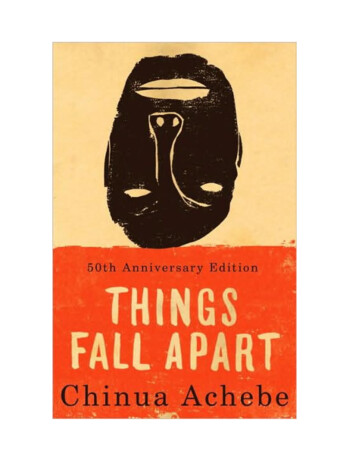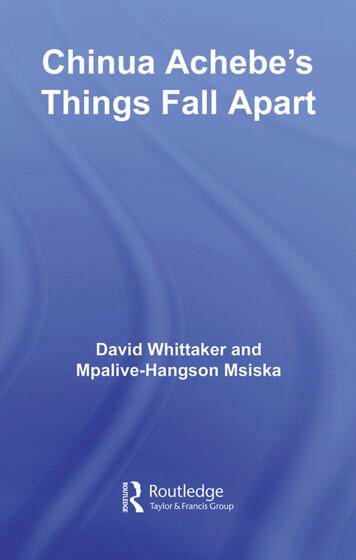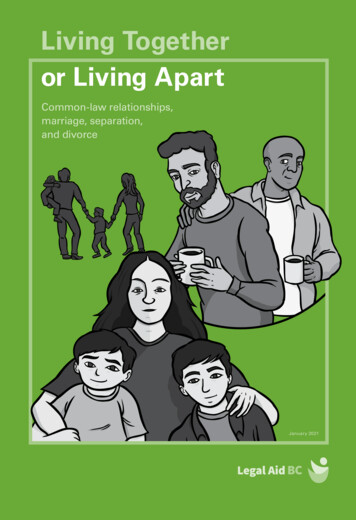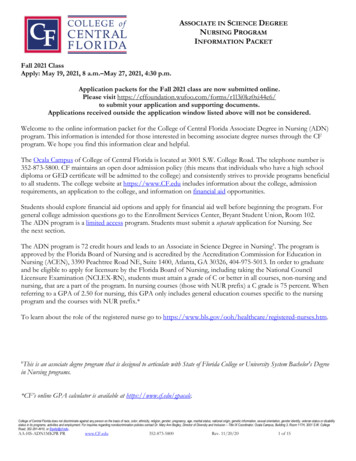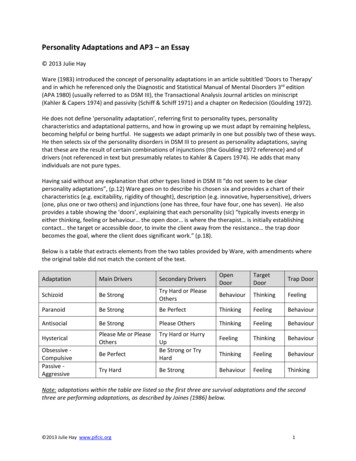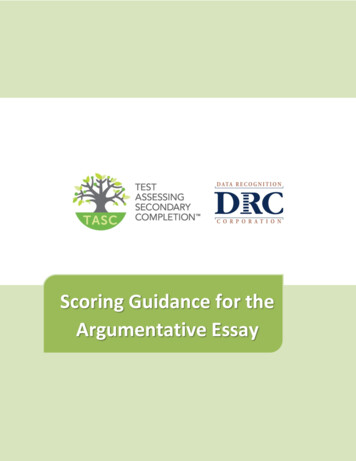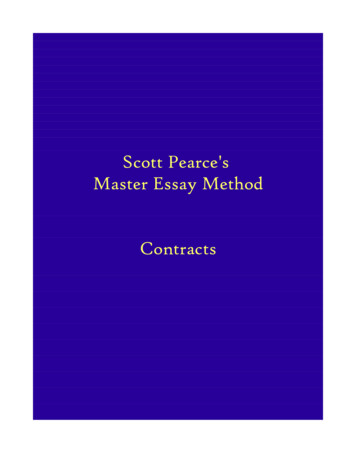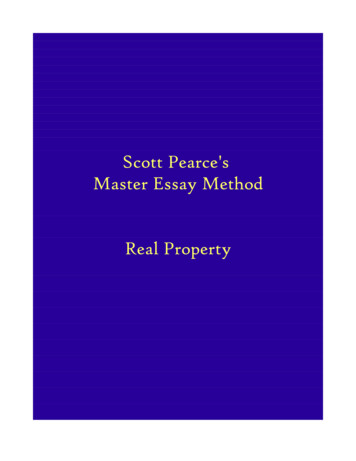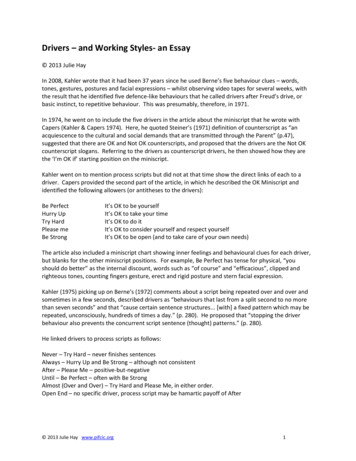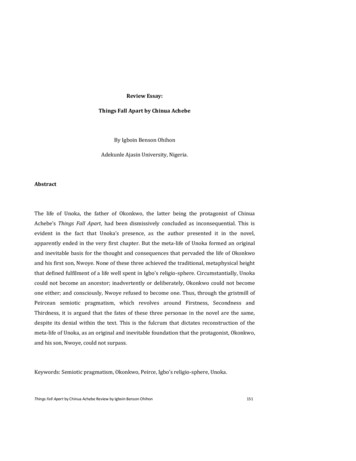
Transcription
Review Essay:Things Fall Apart by Chinua AchebeBy Igboin Benson OhihonAdekunle Ajasin University, Nigeria.AbstractThe life of Unoka, the father of Okonkwo, the latter being the protagonist of ChinuaAchebe’s Things Fall Apart, had been dismissively concluded as inconsequential. This isevident in the fact that Unoka’s presence, as the author presented it in the novel,apparently ended in the very first chapter. But the meta-life of Unoka formed an originaland inevitable basis for the thought and consequences that pervaded the life of Okonkwoand his first son, Nwoye. None of these three achieved the traditional, metaphysical heightthat defined fulfilment of a life well spent in Igbo’s religio-sphere. Circumstantially, Unokacould not become an ancestor; inadvertently or deliberately, Okonkwo could not becomeone either; and consciously, Nwoye refused to become one. Thus, through the gristmill ofPeircean semiotic pragmatism, which revolves around Firstness, Secondness andThirdness, it is argued that the fates of these three personae in the novel are the same,despite its denial within the text. This is the fulcrum that dictates reconstruction of themeta-life of Unoka, as an original and inevitable foundation that the protagonist, Okonkwo,and his son, Nwoye, could not surpass.Keywords: Semiotic pragmatism, Okonkwo, Peirce, Igbo’s religio-sphere, Unoka.Things Fall Apart by Chinua Achebe Review by Igboin Benson Ohihon151
IntroductionConsequent upon the avalanche of hermeneutic guides provided by Chinua Achebe himselfin the construction of Things Fall Apart, critics and scholars have, over the past five decadesuntiringly pursued a myriad of interpretive possibilities in their various discourses on thetext.Some of these interpretive channels include, but are by no means limited to,multiculturalism, imperialism or colonialism, intrusion of Christianity and the resilience oftraditional Igbo belief: clash of civilisations (Mazrui 2012). In effect, critics have, with goodreasons, interpreted Achebe’s Things Fall Apart as his answer to the limited and mostlyerroneous presentation of Nigerian life and customs found in literature written and indeedsanctioned by the colonial powers. For instance, Abiola Irele, foremost critic of Africanliterature, states that Achebe’s Things Fall Apart “has acquired the status of a classic.byreason of its character as a counterfiction of Africa, in specific relation to the discourse ofWestern colonial domination.” (Irele 2000:2). It does appear, as has been put forward bycritics, that one of the reasons for which Achebe wrote the novel, Things Fall Apart was forthe purpose of educating his readers about the value of his African culture. This educationwas necessitated by the cultural identity crisis and its attendant threat of culturalannihilation – with which the African was faced – occasioned, as it was, by imperialism anda surfeit of existing literary outputs which portrayed the African in much less than pleasantcolours. Joseph Conrad’s Heart of Darkness and Joyce Cary’s Mister Johnson are cases inpoint. On the obviously overwhelming, favourable critical attention which Conrad’s Heartof Darkness in particular received, Achebe himself (Robertson 1980: 106) declares, “I haveno doubt that the reason for the high rating of this novel in Europe and America is simplythat there it fortifies fears and prejudices.” Ernest Emenyonu, (Hunter 2002) speaking invery strong terms, avers, unequivocally, thatThings Fall Apart is indeed a classic study of cross-cultural misunderstandingand the consequences to the rest of humanity, when a belligerent culture orSouthern Semiotic Review Issue 6 (1) 2015152Comment [U1]: Between comas
civilization, out of sheer arrogance and ethnocentrism, takes it upon itself toinvade another culture, another civilization.There was therefore a yawning need for cultural renaissance especially in the yearsimmediately before and after Nigeria’s independence. This necessarily found a neededhaven in the thoughts propounded by Achebe in Things Fall Apart. Ogbaa (1999: 87 cited inFoley 2001:40) sees it as “the African novelists’ novel.”While all of these are legitimate interpretations, this present enterprise unearths thefates of a lineage within the Igbo traditional religion itself, and demonstrates howChristianity tended to help in the fulfilment of the metaphysical destinies of Unoka,Okonkwo and Nwoye. This line of thought has not yet been pursued despite the avalancheof review that the novel has elicited. Through the gristmill of Peircean semioticpragmatism, therefore, we espouse that though the three personae lived different lifestyles, they were nevertheless bound by a single string of destiny, which they could nothelp, or escape from.Theoretical GroundingCharles S. Peirce is one of the profoundest philosophers whose seminal ideas ofwhat we call ‘semiotic pragmatism’ have been applied not only in philosophical circles butalso in the sciences. For instance, in his “Energy, semiosis and emergence – the place ofbiosemiotics in an evolutionary conception of nature,” Eliseo Fernandez explored Peirce’sidea within biological sciences as a special niche within the general sciences. This is arrivedat by what Fernandez calls channelling and causation. According to him, “physical causesact by channeling the spontaneous tendency of energy towards its dissipation. Thischanneling takes place through the agency of resistive constraints, which act through theembodiments of habits, i.e., propensities to reproduce similar behavior each time similartriggering circumstances are reproduced” (Fernandez 2011:3). It is from this process thatThings Fall Apart by Chinua Achebe Review by Igboin Benson Ohihon153Comment [U2]: Make sure ofconsistency in the use of British or USspellingComment [U3]: Same as above
Fernandez espouses his spontaneity, constraint and habit dynamics that corresponds toPeirce’s Firstness, Secondness and Thirdness. Significant for us in this enterprise isFernandez’s conception of habit that implicates the fact that similar conditions reproduceComment [U4]:similar effects within the scope of constraints flow, which he refers to as second orderComment [U5]: Perhaps a synonymin order to avoid repetition?causation. It is on this premise that we find it necessary to give vent to a paradigm shift inthe critical study of Things Fall Apart, because, as we shall demonstrate shortly, contrastflow of ‘energy’ reproduces similar metaphysical destiny. This will be demonstrated in thelife of Nwoye, who though believes differently from his father and grandfather, yet suffersthe same metaphysical fate in Igbo religious cosmology.According to Carsten Herrmann-Pillath (2010), Peirce distinguishes between theobject, the sign and the interpretand. This triangular structure is germane, “because it goesbeyond the simple idea of a dyadic relation between sign and object. Sign and object areessentially related with the interpretand. It is then straightforward to establish equivalencewith the components of functions, in a double sense. Firstly, the triadic structure reflectsthe different structure of causality in relating a cause object to an effect sign via afunction interpretand.” In this triadic structure, sign forms the core because objects arenot directly observable, except through signs. In this thinking, the pivot of “semiosis can beseen as a function in the sense that the fundamental causal relation between an objectsystem A and X in the function is insignificant, unless it is coupled with the Z that resultsfrom proper functioning . Therefore, it is the Z that is the sign in the Peircian sense” (29).Although Herrmann-Pillath argues this in terms of entropy, we argue here that theunderlying cause in Unoka, Okonkwo and Nwoye’s inability to become ancestors is sociallylocatable (or to use Fairclough, Jessop and Sayer’s (2001: 25) terms, “the social” isnecessarily relational), within the text but with deep metaphysical context that calls forinvestigation. In another breath, Herrmann-Pillath submits, “a sign is seen as an indicatorof underlying constraints of the object. The inferred constraints become subject to furtherinteractions between object and interpretand, which can result into a further modificationof the sign. Thus, abduction naturalized refers to the evolutionary sequence of signs andinterpretands, converging to an underlying set of physical constraints on the object” (30). Itis in this context that an underlying sequence of causality is established.Southern Semiotic Review Issue 6 (1) 2015154Comment [U6]:Comment [U7]: Synonym? i.e.‘defend’ ‘pose’
Fairclough, Jessop and Sayer’s (2001) perspective is important here because of theobvious silence on the influence and implication of Unoka’s destiny or destination in thecontext of the main character, Okonkwo. They argue that though semiosis depends on abroader social context, implying the possibility of studying “semiosis in isolation from itscontext, [such methodology] offers an incomplete account of social causation and risksfalling into one or more kinds of reductionism” (1). It is for this reason that the Igbo socioreligio-sphere becomes an inevitable resource to which one must recourse for theunderstanding of the context of Things Fall Apart.Also important is the problematique of proving. For instance, from the title of thisarticle, it is clear that a logical connexion will be required to ascertain whether or not theargument of this paper is sound. While this is pertinent, it is equally true that insemiosphere, proving should not be supposed to be the main cut and thrust. While provinggoes pari pasu with reasoning, it is not altogether a necessity to teach the didactic lesson ofsemiology and critical metaphysics. Hence semiotics, in its original conception, is “theComment [U8]: A footnote brieflyclarifying the concept for those whohave not read Lotman might behelpful.science of signs and their life in society” (Winslow 2004: 1). Ana Hesselbart (2007)expresses the complexity of proof when he argued that what make up human systems suchas human language, music, cooking, dressing, etc., are intricately structured; though theyhave what is common to them just as what is dissimilar in them. Their commonality is sign;sign is used by them but in different ways to communicate different meanings. Hence, “asign is more than a simple notation, it is a sort of a complex relation in which diversefactors play. First we have to consider that every time we find a sign there is an implicitobject involved. An object is a material or abstract 'thing' with certain content which isrepresented in the sign, then when we look at the sign: it has content of the objectrepresented in a particular sign called the signified and there is a way in which the objectis represented i.e. the material expression of the sign called the signifier. The concept ofComment [U9]: She? Ana isusually a woman’s nameComment [U10]: argues? Presenttense is used in ‘expresses’ so thereshould be concord.Comment [U11]: Revise syntax inthis sentencePerhaps that the making up of is Comment [U12]: Based onsemiotics?Signs are used by them in differentways Comment [U13]: No need for thiswhat a sign is globalises various aspects at once: the content, the meaning, the signifier, thesignified, the object and even a stating context” (4). A sign is thus better known throughnoesis, that is, “the intentional act of intellect” or “the action and the effect ofunderstanding” (5). What is immediately implicated here is that even though we claim toThings Fall Apart by Chinua Achebe Review by Igboin Benson Ohihon155Comment [U14]: Please indicate theauthor. It is not clear if this isHesselbart or Peirce.
know a sign and its meanings in everyday life, there is a sense in which we are confused onsign components. Conversely, the components of sign and their meaning may alsotranscend the obvious, ordinary or everyday meanings, thus making signs fluid orchanging, but without breaking totally from its traditional conception. This is attested to forinstance, when one devotes a quantum of time to investigate the metamorphosis andpolysemy of particular signs. This will become clearer when we stitch together the form of‘pragmatic’ connectivity in the destinies of the three characters we investigate in Achebe’sThings Fall Apart.In Peirce’s pragmatism, one finds a fundamental paradigm that defines a chain ofserial inter-actions guided by normativity, and in our context, meta-normativity. Theessence of his pragmatism is expressed in his words thus: “the full meaning of aconceptually grounded predicate implies certain types of events that would likely occurduring the course of experience, according to a certain set of antecedent conditions” (citedComment [U15]: Peirce cited in in Queiroz and Merrell 2006: 39). This is realised through semiosis in its interrelatednessand interaction in a context and the role of interpreters.João Queiroz and Floyd Merrell’s (2006) weave of Peircean pragmatism andessay. According to Rescher, semiosis is processual in that it involves “a coordinated groupComment [U16]: First name. Usuallythe first time a scholar is mentioned,his/her first name should be alsomentioned. No need to repeat thename after that first timeof changes in the complexion of reality, an organized family of occurrences that areComment [U17]: Revise syntax hereRescher’s semiosis lucidly brings out the beauty of semiotic pragmatism pursued in thissystematically linked to one another either causally or functionally” (Rescher, 1996: 38,cited in Queiroz and Merrell, 39). Peirce’s semiotics, that is, “formal science of signs” andComment [U18]: thepragmatic notion of meaning, that is, “action of signs” formed the basis of his philosophicalComment [U19]: I would not repeat‘that is’ in the same sentence.Perhaps just ‘where .In any case the syntax in this entiresentence seems to be wrong. Pleaserevise.enterprise, which undergirds our discourse. This, according to Queiroz and Merrell, can bediscerned in his concept of Firstness, Secondness and Thirdness. In the Firstnesscategories, we think of actions that have no sequel to any causal effect. In the Secondnesscategories, we can think of actions that are caused but not necessarily related to theThirdness categories. The Thirdness categories can be conceived as actions that arecapable of enacting a relationship between Firstness and Secondness in the same way assuch actions relate themselves to the first two categories. Firstness is a pure state ofuncausality; mathematically, the point of origin, or literarily an alpha point. WhileSouthern Semiotic Review Issue 6 (1) 2015156Comment [U20]: Please complete.These aspects, for instance, can bediscerned, according to Q and M, inPeirce’s concept of
Secondness is a state of reaction, differentiation, oppositionality or brutal action, Thirdnessis a state of mediation or cognition that tends to be predictable given certain set ofconditions (39-40). This is distinguished from Firstness that involves becoming, andSecondness that is viewed in terms of “presently existing,” a surety.This triadic structure of Peirce’s semiotic pragmatism is consciously crafted tocorrespond to the three personae being considered in this work. In the meantime, it isnecessary to introduce the cosmology of the Igbo people among whom the novel wasprimarily written.Comment [U21]: This section is notall that clear. I think that theexplanation would benefit enormouslyfrom Claudio Guerri’s ideas; see e Igbo People of NigeriaAs one of the major ethnic nationalities in Nigeria, the Igbo are traditionally situated in thesouth-eastern part of the country. Although a plural ethnic nation, the Igbo possess high“individualistic ethic” (Achebe 2012: 75), which they operate within the context ofcommunality. Otternberg has said that the Igbo “consists of more than two hundredComment [U22]: First nameindependent territorial groups, each composed of one or more villages or dispersedresidential groupings” (cited in Nnoruka 2009: 176). Mostly farmers, fishermen andbusiness people, the Igbo are well exposed and travelled.Religiously, the Igbo believe in the supreme deity called Chukwu or Chineke,believed to be the creator of the universe. They venerate such important lesser deities asAmadi-oha, the god of lightning and Ani, the god of the earth, among others. The pride ofplace the ancestors occupy in Igbo cosmology cannot be over-emphasised. Nnoruka (2009:177) posits that the “ideology of ancestor worship occupies an important place in theirreligious philosophy.” It is this that society’s morality is basically anchored, the sameconcept that explains their metaphysical worldview as well as their socialisation process –anamnesis.The rites of passage begin with birth and continue until the memory of an ancestoris lost on the living. Becoming an ancestor is a revered desire of the Igbo; it is the ultimatespace for the communion with others who had earlier become one. Such things thatThings Fall Apart by Chinua Achebe Review by Igboin Benson Ohihon157Comment [U23]: This goes after thequoteComment [U24]: where
prevent one from attaining that metaphysical feat are cautiously avoided during one’s life.Particularly important for us here are suicide and denial of burial which preclude a personfrom assuming ancestor-hood. Again, Nnoruka (2009: 185) avers: “suicide is anotherComment [U25]: after the quoteabominable offence against the land. Life is precious to the community. So he who removeshis life is an enemy of the community. Such a person is buried without any ceremony. He, ofhis own accord cut himself off from the community and the community cannot bid him thefinal fare well.” This captures squarely the fate of Okonkwo. Such a person is buried like adog, just to prevent any environmental hazard; he has no grave and therefore cannot bevenerated. Since death is not “a definitive end” because at death, a fulfilled “one rejoins theancestors,” burial constitutes the real process for the preparation for the admission into theComment [U26]: fulfillment ? ifthis is a qualifier /adjective it needs aname after it.realm of the ancestors (216). Indeed, “a befitting burial is what every Igbo person wishesfor himself. This is because with it one remains part of the community and will continue toplay the role of the ancestor” (Ezekwonna 2005: 45).The clash of civilisations and multiculturalism hinted earlier come to play in ThingsFall Apart and in contemporary pluralist Igbo religio-cultural context. Consequent upon theimportance of ancestor-hood and the inevitability of the infiltration of Christianity, aninculturation theology evolved that sees Jesus Christ as the Proto-Ancestor, that is, the FirstAncestor, to whom all other ancestors are joined. “Hence he [Jesus] gets a transcendentalrecognition in which the life of all ancestors depends on him” (Ezekwonna 2005: 241).Comment [U27]: First nameMalingo expressly states in this regard: “until the people see the role of Jesus as being in thehierarchy of spirit-world that is of our ancestors, it will be hard to uproot completely fromtheir beliefs” (cited in Ezekwonna 2005: 241). The critical argument that this philosophicalreligion and culture championed by the Catholics, which obviously Achebe disregards inrelating the traditional religious and metaphysical reality of the Igbo is, would Jesus, whowas killed on the cross, be qualified to be an ancestor in the Igbo context, given thatOkonkwo died on a tree too? Starkly speaking, would the Igbo say that Jesus Christ met thetraditional Igbo qualifications to be their ancestor? These questions are germane becausethey border on the fate of Nwoye, the son of Okonkwo who had become a Christian evenbefore the death of this father. Okonkwo readily understood the implications of his sonbecoming a Christian: he, that is, Okonkwo would not be venerated as an ancestor becauseSouthern Semiotic Review Issue 6 (1) 2015158Comment [U28]: Revise syntax
Christians had denounced such practice as idolatry; Nwoye himself would also not becomean ancestor because in Christianity, there is no place for ancestorhood. Therefore, this isnot just a “clash of ideologies or kingdoms” as Shenk (1988) says, neither is it only a “clashof civilisations” as Huntington (1996) has said, but an “unqualified dialogue” as Ezekwonna(2005: 27) suggests.Unoka: Circumstantially Misses Ancestor-hoodIn Things Fall Apart, Unoka, the father of Okonkwo is introduced as a wretched,poor, “lazy and improvident” persona who brings nothing but disgrace to himself andfamily (Achebe 3). He is framed as unable to fend for his family and consequently equallyunable to take the least title in the community. He is a debtor par excellence, because heshrewdly borrows from everyone he possibly could borrow from despite his inability topay back. Bravery and success in his community are defined in terms of the number ofheads a person is able to bring home from war, barn of yams, wives, children, titles, etc.Unoka’s life is a stark opposite of such definition. He ‘manages’ to marry a wife and raises afew children, and no more. Although, Unoka is described as a failure even at what gave himthe best mood in life – music – he leaves a memory of what he could make of life. Hismelancholic mood is short-lived or disappears whenever he is on his flute. Achebederogatorily puts it thus:He was very good on his flute, and his happiest moments were the two orthree moons after the harvest when the village musicians brought down theirinstruments, hung above the fireplace. Unoka would play with them, his facebeaming with blessedness and peace. Sometimes another village would askUnoka’s band and their dancing egwugwu to come and stay with them andteach them their tunes. They would go to such hosts for as long as three tofour markets [about sixteen days], making music and feasting (Achebe 4).Things Fall Apart by Chinua Achebe Review by Igboin Benson Ohihon159Comment [U29]: Some quotesdirectly from Things Fall Apart wouldbe beneficial to support yourargument here.
Even though Unoka could not do farming, he also could not break even in his musicenterprise. At any rate, he is an excellent musician and a good music teacher, invited byother villages: this is in recognition of his musical knack. His soul is tied to music, but in acommunity where music does not bring wealth, Unoka is considered a weakling and failure.Unoka, like any other traditional African, thinks that his failure is due to some metaphysicalcause or force that needs to be appeased. As would others, he consults the gods of the landto find out what is responsible for his failure in agriculture. According to him, ‘every year before I put any crop in the earth, I sacrifice a cock to Ani, the owner of all land. It is the lawof our fathers. I also kill a cock at the shrine of Ifejioku, the god of yams. I clear the bush andset fire to it when it is dry. I sow the yams when the first rain has fallen, and stake themwhen the young tendrils appear. I weed’ (Achebe 12-13). But the priestess needed noconsultation with the god to diagnose the cause of Unoka’s failure. It is common knowledgethat his blight is “the weakness of your matchet and your hoe” (Achebe 13). Whereas realmen cultivate “virgin forests,” Unoka invests his little strength in over-cultivated land thathas exhausted all its nutrients.Finally, at death, Unoka “had no grave” (13). He has no grave because he dies a baddeath. Bad death is a death that is not peaceful: death caused by accident, evil sickness, ordeath at young age. Such people who die as a result of any of these are not buried. Unokadies as a consequence of “swelling which is an abomination to the earth goddess. When aman was afflicted with swelling in the stomach and the limbs he was not allowed to die inthe house. He was carried to the Evil Forest and left there to die . The sickness was anabomination to the earth, and so the victim could not be buried in her bowels. He died androtted away above the earth, and was not given the first and second burial. Such wasUnoka’s fate. When they carried him away, he took with him his flute” (Achebe 13).The above is instructive in this work. And one cannot grasp its import without someknowledge of the cosmology and ontology of the Igbo. T. Uzodinma Nwala (1985:2)delineates two worldviews, the “traditional” and the “modern”, both being coterminous asat time of the writing of the text. In the traditional Igbo worldview, therefore, the phrase,‘had no grave,’ means that Unoka was severed from his family and community at death. Thegrave is not just a piece of land where a person is buried; it is much more. It is the symbolSouthern Semiotic Review Issue 6 (1) 2015160Comment [U30]: Was unable tobreak evenStylistic variation so as to avoid therepetition of ‘could’ in the samesentence.
of a connecting space for the full reunion of the deceased and his essence first andforemost. For at birth a new baby’s placenta is normally or ‘ritually’ buried in the earth. Theplacenta is believed to be waiting for its other grown part (the person) to reunite with it atdeath (Bujo 1997). By virtue of not being buried, Unoka loses that full personal reunionwith himself. Because Unoka is not buried, he also loses the privilege and right of beingvenerated as an ancestor, the highest goal an African wishes to attain. “The dead rightlyclaim honour, reparation, libation of food as well as other things” (Bujo 153). It is only thedead who have graves that can claim such rights and privileges. As it stands in the case ofUnoka, his son Okonkwo had no obligations to him neither did he to his son in return.Unoka is therefore lost forever from the community of ancestors of the people. Hisremembrance is cut off; his relationship with the living permanently erased, except fordidactic lessons which are spoken in whispers to warn the living of the consequences ofsuch death.Although Unoka is presented as weak and fearful, he is nonetheless veryphilosophical and brave at death. One wonders how best to describe a man who knew hewas going to die a bad death and yet accepted it with a philosophic equanimity; he takeswith him his flute to the evil forest, where he is to be abandoned to die quietly butexcruciatingly. Even though the community regards Unoka’s flute as a sign of poverty andweakness, we can see it as a symbol of courage and peace of the soul. The flute should notalways be viewed as the generality of the people saw it; it must also be seen from theperspective of the flutist himself, and how Unoka uses it as a sign or symbol ofaccomplishment against the tide of failure and rejection by his community. To die fluting is,to Unoka, to die in his trade: making peace and melody, not for the depreciable body but forthe eternal soul. This is significant because as we shall demonstrate later, Okonkwo whobelieves his father is his only blight does not die as peacefully as his father, though theyboth die in unacceptable manner. Unfortunately, Okonkwo defiantly does not take hisfather’s philosophical and prophetic words seriously. For him, those words are product of aweak and sickly mind ready to expire a moment later. We hear Unoka encouraging his son:“Do not despair. I know you will not despair. You have a manly and a proud heart. A proudThings Fall Apart by Chinua Achebe Review by Igboin Benson Ohihon161
heart can survive a general failure because such a failure does not prick its pride. It is moredifficult and more bitter when a man fails alone” (Achebe 18). And indeed, Okonkwo failedalone!Achebe’s ‘photorealistic’ description of Unoka’s flute evokes a metaphysic signimage that can be deciphered only if it is viewed beyond the prism of economistic practice.Although Unoka’s flute reflects a kind of everyday instrument, Agnieska Juzefovic (2013:124) argues that “everyday objects have something particular, even metaphysic – theyremain not simple tools by mysterious things themselves.” It is partly in this sense that wecan grasp the essence and authenticity of life Unoka’s flute uncloses to the Igbo. As MartinComment [U31]: Place allreferences after quotations. Pleaserevise the entire paper to make sureof this.Heidegger (1977: 163, cited in Juzefovic, 2013: 126) lucidly puts it: “the equipmental beingof the equipment consist indeed in its usefulness. But this usefulness itself rests in theabundance of an essential Being of the equipment.” Thus, Unoka’s meditative orcontemplative approach uncloses more than what an aggressive, unreflective approach tolife does offer. Also, we can agree with Wilde (2007: 131, cited in Juzefovic, 2013: 124) thatComment [U32]: First name.Unoka’s flute can be interpreted as a demonstration of an artiste’s instrument thatComment [U33]: After thequotationproduced encyclopaedic information; a reflection of “leading or serious artist [who] couldbe expected to have had some sophisticated knowledge and reflective understanding of thetradition in which he or she was working.” In realistic terms, the flute is not just aninstrument, it is a barrel of wisdom, and a ‘discloser’ of secret acts hidden from the glare ofthe community. That Unoka dies fluting is a sign of a personal ‘burial’ even though thesociety disregards it.In this Firstness, we meet Unoka, who is not introduced as having a father; neither ishis so-called failure caused by forces beyond himself. He is the architect of his misfortune.Not cared for, Unoka dies a bad death and loses the right of veneration to a sickness thatcould have been cured should he be attended to. A cultural-metaphysical foundation of‘gravelessness’ has been inadvertently laid, which future generations would build uponthough from different circumstances. Even though Diana Akers Rhoads (1993) extensivelyexplored the cultural basis of the novel, she definitely missed this met
The life of Unoka, the father of Okonkwo, the latter being the protagonist of Chinua Achebe’s Things Fall Apart, had been dismissively concluded as inconsequential. This is evident in the fa
